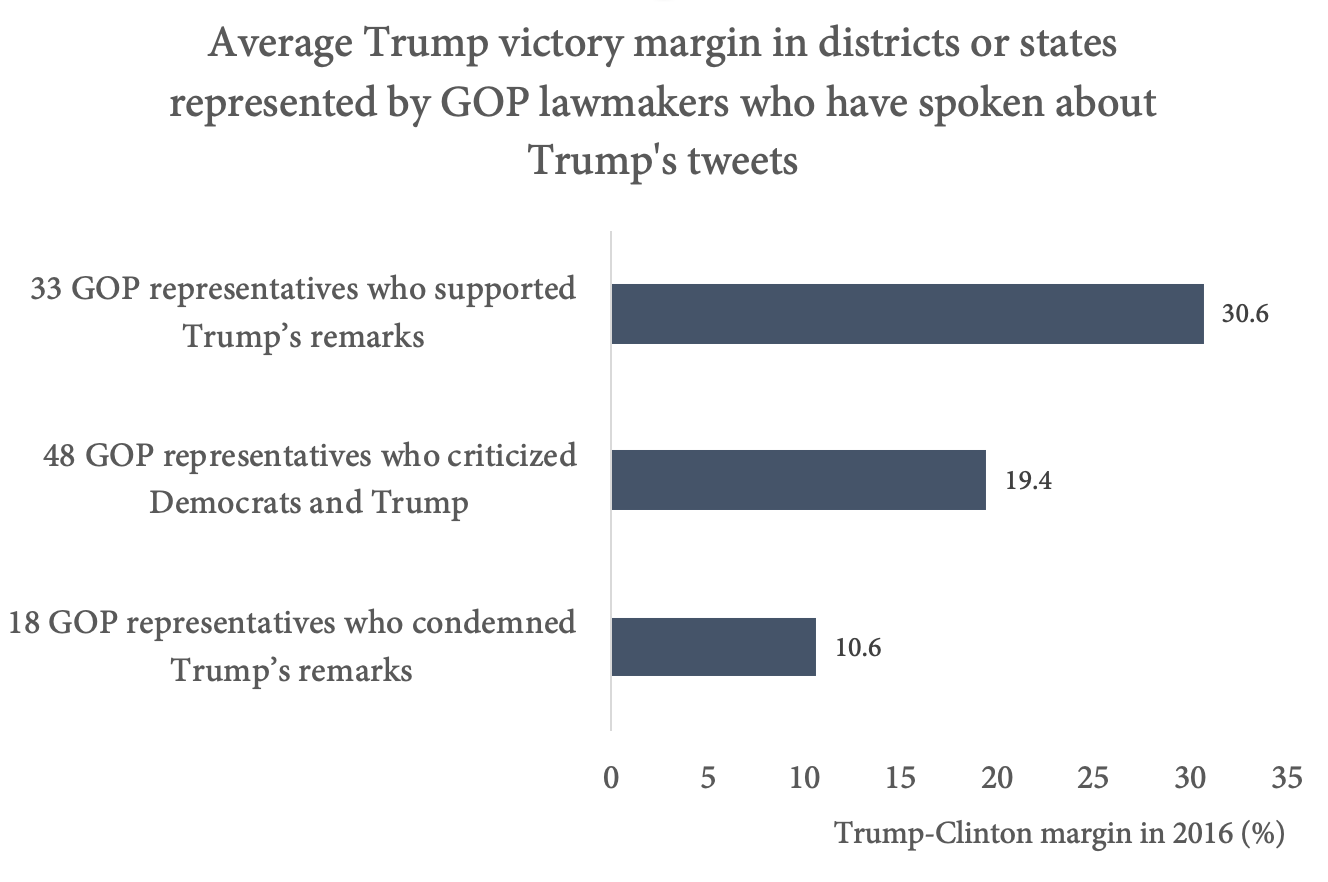Is Donald Trump tightening his grip on the Republican Party? This week, only four House Republicans voted to condemn Trump’s latest questionable tweets — which may make it seem that the GOP is united behind Trump.
But nearly 20 Republicans have unequivocally condemned Trump’s language in recent days. Their actions reveal a clear political calculus. Lawmakers are responding to a different set of incentives, depending on what type of district they represent.
Republicans have responded to Trump’s offensive comments in three ways
A Washington Post team collected 99 GOP lawmakers’ reactions to Trump’s inflammatory comments taunting four progressive Democrats — the “Squad” of Reps. Alexandria Ocasio-Cortez (N.Y.), Ilhan Omar (Minn.), Ayanna Pressley (Mass.), and Rashida Tlaib (Mich.) — by telling them to “go back and help fix the totally broken and crime infested places from which they came.”
The Post’s first group of GOP lawmakers offered statements that forcefully condemned those statements. The second group criticized Trump’s statements along with Democrats’ past actions or recent policy proposals. Most Republican politicians who did take note of Trump’s Sunday tweets fell into this category.
Lawmakers in the third group either defended the president outright or labeled progressive Democrats as “far left,” “communist,” or “anti-American” — affirming the president’s message. This group includes Rep. Liz Cheney of Wyoming, who echoed Trump when tweeting that socialist “policies are dangerous, wrong, and would destroy America.”
Why are Republicans responding differently?
In response to losing the House in 2018, the National Republican Congressional Committee concluded that, according to New York Times reporting, it needed to be ruthless in communicating. “Maybe name-calling raises money, and that’s what we’ve become,” conceded Thomas J. Rooney, a former Republican congressman.
So why did some GOP lawmakers criticize Trump earlier this week? As you can see in the figure below, those who stood up to Trump come from places where Trump is relatively less popular, compared with other red districts or red states in the country.

Trump beat Hillary Clinton in 2016 by 10.6 percentage points on average in the districts (or, in four cases, states) represented by Republican members of the House or Senate who condemned Trump’s tweets about Ocasio-Cortez and her colleagues.
By contrast, Trump’s victory margin was significantly larger in states or districts represented by lawmakers who have defended Trump’s comments. On average, Trump won these constituencies by nearly 31 percentage points.
To be sure, district composition doesn’t completely predict which lawmakers feel they must take a stance. On the surface, it might seem that lawmakers in safer districts have more freedom to say with no filter how they feel, and that politicians in potentially competitive districts sense they ought to reassure voters at home by maintaining daylight between themselves and the president.
But it’s equally likely that, if Trump is viewed as king of primary politics, then even lawmakers in deep-red districts worry that failing to defend Trump could lead to being challenged in the Republican primaries, complicating their political futures. Trumpian tweets may, in fact, be engineered partly to function as a public loyalty test, allowing the president to gauge who is “with him” no matter what.
Jan Zilinsky (@janzilinsky) is a research associate at the New York University Social Media and Political Participation Lab and a PhD candidate in NYU’s department of politics.



